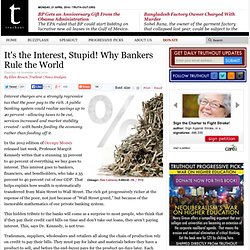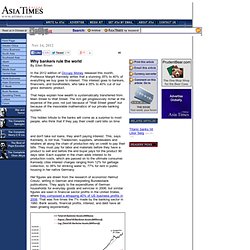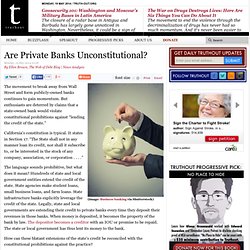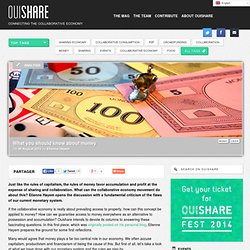

Wells Fargo fares poorly in survey of bank reputations. 12-Year Old Child Reveals One of the Best Kept Secrets in the World.flv. The Occupy Money Cooperative. Public Banking Institute - Banking in the Public Interest. Wapublicbankproject.org - wapublicbankproject.org. How to Liberate America from Wall Street Rule. It's the Interest, Stupid! Why Bankers Rule the World.
(Image: Jim Larson; Edited: JR / TO)Interest charges are a strongly regressive tax that the poor pay to the rich.

A public banking system could realize savings up to 40 percent - allowing taxes to be cut, services increased and market stability created - with banks feeding the economy rather than feeding off it. In the 2012 edition of Occupy Money released last week, Professor Margrit Kennedy writes that a stunning 35 percent to 40 percent of everything we buy goes to interest. This interest goes to bankers, financiers, and bondholders, who take a 35 percent to 40 percent cut of our GDP. That helps explain how wealth is systematically transferred from Main Street to Wall Street. The rich get progressively richer at the expense of the poor, not just because of "Wall Street greed," but because of the inexorable mathematics of our private banking system.
Tradesmen, suppliers, wholesalers and retailers all along the chain of production rely on credit to pay their bills. Consider California. Interest - Margrit Kennedy. Data/bibo/media/GeldbuchEnglisch.pdf. Why bankers rule the world. Why bankers rule the worldBy Ellen Brown In the 2012 edition of Occupy Money released this month, Professor Margrit Kennedy writes that a stunning 35% to 40% of everything we buy goes to interest.

This interest goes to bankers, financiers, and bondholders, who take a 35% to 40% cut of our gross domestic product. That helps explain how wealth is systematically transferred from Main Street to Wall Street. The rich get progressively richer at the expense of the poor, not just because of "Wall Street greed" but because of the inexorable mathematics of our private banking system. This hidden tribute to the banks will come as a surprise to most people, who think that if they pay their credit card bills on time and don't take out loans, they aren't paying interest. Her figures are drawn from the research of economist Helmut Creutz, writing in German and interpreting Bundesbank publications. Adapted from here . Source: lanekenworthy.net Exponential growth is unsustainable. Reviving Main Street: A Call for Public Banks. WHERE HAVE ALL THE SMALL BUSINESS LOANS GONE?

When Sergio Lub, a small business owner in Walnut Creek, submitted public testimony to the Banking and Finance Committee on May 2, 2011 supporting the creation of a state-owned bank in California, he wrote from personal experience, as well as knowledge of the elephant in the room: “…I long for the treatment I used to receive from the former Contra Costa Bank of Walnut Creek. Whenever I needed working capital, I just made a phone call and it was done.
“After our bank was bought by Wells Fargo, getting a credit line became increasingly more complicated to the point that now ― even after being a customer for 36 years ― we no longer qualify for loans. This is because our type of business (handcrafting and wholesaling of jewelry), does not conform with the standard type of businesses Wells Fargo seeks to bundle and easily re-sell to Wall Street investors. The New York Stock Exchange on Wall Street in New York City. HOW DO PUBLIC BANKS OPERATE? 1. More States May Create Public Banks by Ellen Brown: Beyond North Dakota. Info posted May 13, 2010 By 2011, only one state will have escaped the credit crunch that is pushing other states toward insolvency: North Dakota . North Dakota is also the only state that owns its own bank. Are Private Banks Unconstitutional? (Image: Business banking via Shutterstock)The movement to break away from Wall Street and form publicly-owned banks continues to gain momentum.

But enthusiasts are deterred by claims that a state-owned bank would violate constitutional prohibitions against “lending the credit of the state.” California’s constitution is typical. It states in Section 17: “The State shall not in any manner loan its credit, nor shall it subscribe to, or be interested in the stock of any company, association, or corporation . . . .” The language sounds prohibitive, but what does it mean? Money matters: what you should know about the monetary system. Just like the rules of capitalism, the rules of money favor accumulation and profit at the expense of sharing and collaboration.

What can the collaborative economy movement do about this? Etienne Hayem opens the discussion with a fundamental criticism of the flaws of our current monetary system. If the collaborative economy is really about prevailing access to property, how can this concept be applied to money? How can we guarantee access to money everywhere as an alternative to possession and accumulation? Ouishare intends to devote its columns to answering these fascinating questions. Many would agree that money plays a far too central role in our economy. 1. During the 70s, in France and almost all Western countries, money switched from being issued by democratic, national central banks to private, commercial ones. Conclusion: Money creation, a highly important power that used to be democratic, is now private. 2.